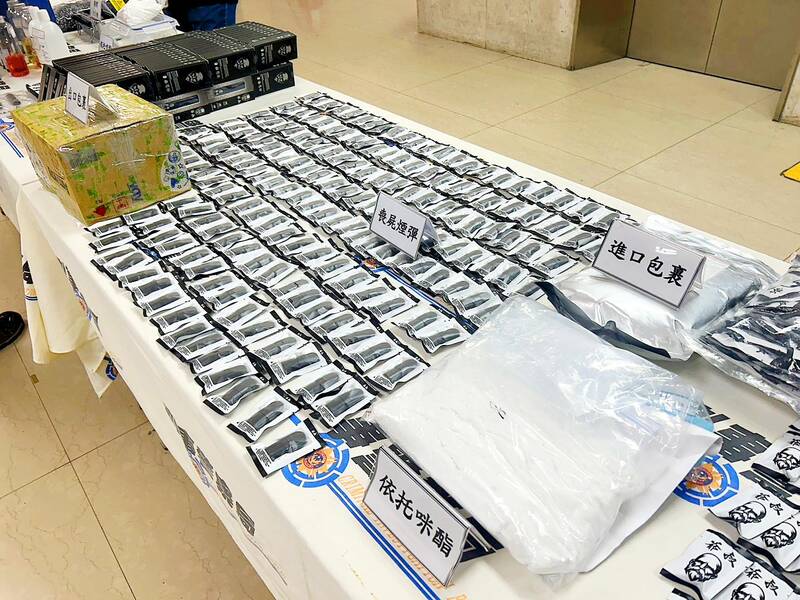The Executive Yuan yesterday passed a new phase of its anti-drug strategy plan, which includes NT$15 billion (US$460.89 million) for enforcement efforts.
The funding would go toward reducing the supply of new drugs such as etomidate, as well as limiting access to the chemicals needed to manufacture them, Deputy Minister of Justice Huang Shih-chieh (黃世杰) told a news conference in Taipei.
High-tech detection methods would be implemented to crack down on Internet-based drug trafficking, with the strategy also calling for cross-border cooperation and intelligence sharing, Huang said.

Photo: Chiu Chun-fu, Taipei Times
The High Prosecutors’ Office is integrating anti-drug resources into its six major enforcement agencies to ensure source tracking and cross-agency cooperation, he said.
For serious cases involving drugs such as etomidate, also known as the “zombie vape” drug, prosecutors would push to seize the proceeds of crimes, he said.
As etomidate is mostly consumed in vape form, Ministry of Health and Welfare officials are coordinating with law enforcement personnel to limit the spread of e-cigarettes using provisions of the Tobacco Hazards Prevention Act (菸害防制法), he said.
Testing capacity will have to be upgraded, with the Food and Drug Administration providing guidance for private institutes to be certified for such processes, he said.
Executive Yuan spokeswoman Michelle Lee (李慧芝) told the news conference that Premier Cho Jung-tai (卓榮泰) has instructed the prosecutors’ office to increase efforts to inhibit narcotics-related crime.
Prosecutors, police, investigative units, military police, coast guard personnel and customs units should be integrated to stop illegal narcotics from entering Taiwan, Lee cited Cho as saying.
The Executive Yuan yesterday approved a Ministry of Justice narcotics review committee plan to reclassify etomidate as a Category 2 narcotic.
It was reclassified as a Category 3 drug in June as a result of rising abuse of the drug in e-cigarettes.
Reclassification to Category 2 means increased penalties for manufacturing, trafficking, transporting and selling etomidate compared with Category 3 drugs, he said.
It also means that possession or use of the drug is a crime, he said.
The Narcotics Hazard Prevention Act (毒品危害防制條例) stipulates that people convicted of using a Category 2 narcotic face a maximum three-year prison term.
Those convicted of possessing it face a maximum two-year term, detention or a fine of no more than NT$200,000, the narcotics act says.
Those convicted of manufacturing, transporting or selling Category 2 narcotics are subject to life imprisonment or a minimum 10-year term and a maximum fine of NT$15 million.
There have been several high-profile cases of “zombie vape” use in the past few months.
On Sunday, a conscript at a military training center was allegedly found in possession of 50 etomidate cartridges, while earlier this year, a police officer was killed by a driver under the drug’s influence.
Additional reporting by CNA

The Taiwanese passport ranked 33rd in a global listing of passports by convenience this month, rising three places from last month’s ranking, but matching its position in January last year. The Henley Passport Index, an international ranking of passports by the number of designations its holder can travel to without a visa, showed that the Taiwan passport enables holders to travel to 139 countries and territories without a visa. Singapore’s passport was ranked the most powerful with visa-free access to 192 destinations out of 227, according to the index published on Tuesday by UK-based migration investment consultancy firm Henley and Partners. Japan’s and

NATIONAL SECURITY THREAT: An official said that Guan Guan’s comments had gone beyond the threshold of free speech, as she advocated for the destruction of the ROC China-born media influencer Guan Guan’s (關關) residency permit has been revoked for repeatedly posting pro-China content that threatens national security, the National Immigration Agency said yesterday. Guan Guan has said many controversial things in her videos posted to Douyin (抖音), including “the red flag will soon be painted all over Taiwan” and “Taiwan is an inseparable part of China,” while expressing hope for expedited “reunification.” The agency received multiple reports alleging that Guan Guan had advocated for armed reunification last year. After investigating, the agency last month issued a notice requiring her to appear and account for her actions. Guan Guan appeared as required,

Japan and the Philippines yesterday signed a defense pact that would allow the tax-free provision of ammunition, fuel, food and other necessities when their forces stage joint training to boost deterrence against China’s growing aggression in the region and to bolster their preparation for natural disasters. Japan has faced increasing political, trade and security tensions with China, which was angered by Japanese Prime Minister Sanae Takaichi’s remark that a Chinese attack on Taiwan would be a survival-threatening situation for Japan, triggering a military response. Japan and the Philippines have also had separate territorial conflicts with Beijing in the East and South China

A strong cold air mass is expected to arrive tonight, bringing a change in weather and a drop in temperature, the Central Weather Administration (CWA) said. The coldest time would be early on Thursday morning, with temperatures in some areas dipping as low as 8°C, it said. Daytime highs yesterday were 22°C to 24°C in northern and eastern Taiwan, and about 25°C to 28°C in the central and southern regions, it said. However, nighttime lows would dip to about 15°C to 16°C in central and northern Taiwan as well as the northeast, and 17°C to 19°C elsewhere, it said. Tropical Storm Nokaen, currently